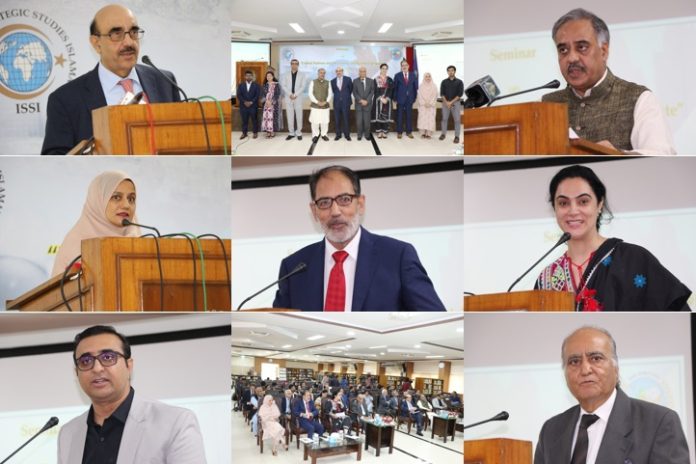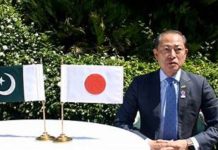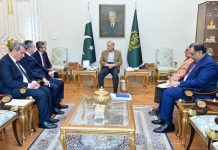In the wake of forthcoming ‘Kashmir Black Day’, the India Study Centre (ISC) at the Institute of Strategic Studies Islamabad (ISSI) organised a seminar on “United Nations and the Jammu and Kashmir Dispute” – coinciding with UN Day (24 October). The event highlighted the complexity of the Jammu and Kashmir dispute and the challenges that the United Nations faces in advancing its purposes and principles as well as implementing its resolutions and ensuring justice for the oppressed people.
Ambassador Masood Khan, former President of Azad Jammu and Kashmir, was Chief Guest on the occasion. Other speakers included: Ms Farzana Yaqoob, former Minister for Social Welfare and Women Development, AJK; Dr. Marium Fatima, Assistant Professor, NDU; and Mr. Altaf Hussain Wani, Chairman, Kashmir Institute of International Relations.
In his welcoming remarks, DG ISSI Ambassador Sohail Mahmood emphasized the importance of UN Day as a time for the international community to reaffirm commitment to the UN Charter and support for multilateralism. He stated that as we commemorate this Day in 2024, the world is confronted with myriad of urgent challenges, including: ongoing wars and nearly 56 active military conflicts; proliferation of non-traditional security threats including climate change; global economic slowdown and reversals in realization of SDGs; democratic backsliding in various parts of the world; increasing use of force to settle disputes; and rampant misinformation and disinformation. While he praised the UN’s humanitarian efforts, he noted that both multilateralism and the UN as an institution remain under assault due to certain member states’ actions. He called for the states and the UN to address issues relating to international peace and security on the basis of principles, rather than power.
Highlighting the UN’s pivotal role in the Jammu and Kashmir dispute, Ambassador Sohail Mahmood commended its steadfast support of the solution prescribed in relevant Security Council resolutions: a free and impartial plebiscite under the UN auspices to enable the Kashmiris to exercise their inalienable right to self-determination. This solution had garnered support from the international community as well as Pakistan and India, but India later reneged on its solemn commitments. He underlined that the Kashmiris’ struggle for self-determination is consistent with Charter principles and UN resolutions. Attempts to equate this just struggle with terrorism is a canard that must be rejected. He further underlined that the Charter principles are immutable and the Security Council resolutions have no statute of limitations. He urged the international community to fulfil its pledges to the Kashmiris and India to honour its own commitments. Going forward, he called for advancing the Kashmir cause through national consensus, a whole-of-the-nation approach, and deft and proactive diplomacy, particularly as Pakistan prepares for its UNSC membership for the term 2025-26. He added that the Pakistani and Kashmiri diaspora should play a pivotal role in raising global awareness and mobilization through extensive parliamentary and media outreach. “We must navigate this complex landscape with creativity and skill.” In the end, he emphasized the importance of ensuring that the sacrifices of Kashmiris and Pakistanis should not go in vain and that the endeavors should continue with perseverance until the Kashmiris’ rights are fully realized.

















